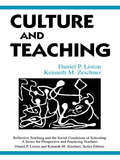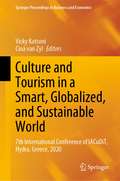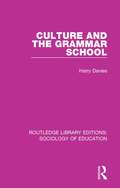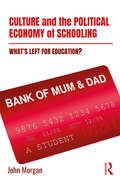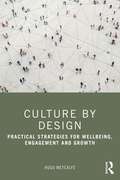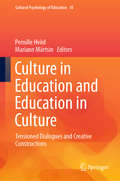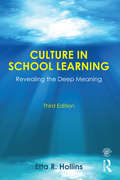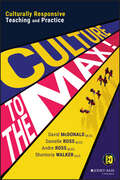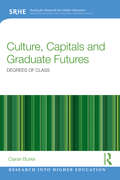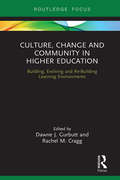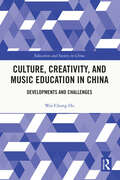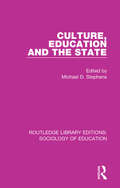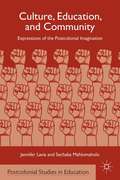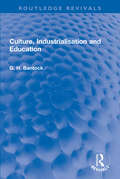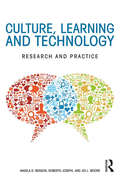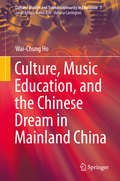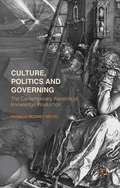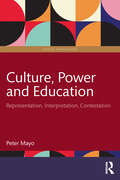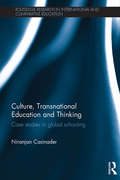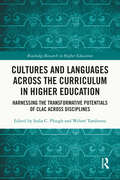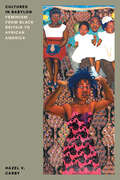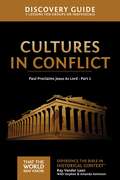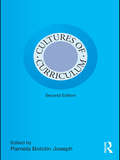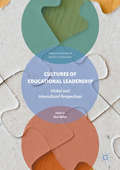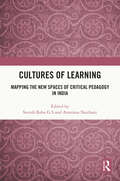- Table View
- List View
Culture and Teaching (Reflective Teaching and the Social Conditions of Schooling Series)
by Daniel P. Liston Kenneth M. ZeichnerThis is the second volume in the "Reflective Teaching and the Social Conditions of Schooling" series. Reflection in the area of culture and teaching necessarily takes teachers on both an introspective journey and an examination of the social conditions of schooling. There is a need to know not only what they believe but also what schools do. It has long been charged that our educational system privileges some and disenfranchises others. Schools are not the equitable institutions that one would hope them to be--a feature of schooling and one that deserves a great deal more attention. This work facilitates an examination of its readers' own beliefs, acquaints them with the sentiments and arguments of others, and encourages them to look further into the social conditions of schooling.
Culture and Tourism in a Smart, Globalized, and Sustainable World: 7th International Conference of IACuDiT, Hydra, Greece, 2020 (Springer Proceedings in Business and Economics)
by Vicky Katsoni Ciná Van ZylThis book gathers the proceedings of the 7th International Conference, with the theme “Culture and Tourism in a Smart, Globalized and Sustainable World,” held on Hydra Island, Greece, on June 17–19, 2020, published with the support of the International Association of Cultural and Digital Tourism.Highlighting the contributions made by numerous writers to the advancement of tourism research, this book presents a critical academic discourse on sustainable practices in the smart tourism context, improving readers’ understanding of, and stimulating future debates in, this critical area. In addition to the knowledge economy and the concept of smart destinations, the book addresses new modes of tourism management and development, as well as emerging technologies, including location-based services, the Internet of things, smart cities, mobile services, gamification, digital collections and the virtual visitor, social media, social networking, and augmented reality.
Culture and the Grammar School (Routledge Library Editions: Sociology of Education #18)
by Harry DaviesThis book, first published in 1965, discusses the nature of the grammar school, its curriculum and teaching methods, comparisons with sixth form education, and the change in its organisation and attitudes during a time of rapid social change in 1960s Britain. This title will be of interest to students of history, sociology and education.
Culture and the Political Economy of Schooling: What's Left for Education?
by John MorganSince the global financial crisis of 2007-08 the question of the aims of schooling have assumed greater importance. There has been no ‘return to normal’, yet young people are encouraged to ‘Keep calm and go to university’. Culture and the Political Economy of Schooling explores the possibilities for the emergence of a progressive agenda for schooling. Culture and the Political Economy of Schooling provides educators and social scientists with the essential background required to understand changes in schooling since the Second World War. It introduces theories of the economic crisis, and explores their educational implications, before going on to provide accounts of how politics and culture have shaped debates about schooling. This cultural political economy approach is applied to issues such as social class, race, the brave new worlds of work, the dangerous rise of creative education, and the increasingly urgent question of inequality. The final parts of the book explore the educational challenges of the Anthropocene and the changing conceptions of knowledge in schools and finally consider alternatives to contemporary schooling. The students in our schools today will face a future framed by the twin crises of economy and environment, prompting an urgent rethink of education. Written in an accessible and engaging manner, this book is an essential guide for thinking about the past, present and futures of education. It will be of great interest to researchers and graduate students of education studies, curriculum studies, sociology of education, education politics and education policy.
Culture by Design: Practical Strategies for Wellbeing, Engagement and Growth
by Hugo MetcalfeCulture by Design is about shifting focus from solely organisational outcomes and performance, towards organisational culture and wellbeing. It bridges the gap between two key organisational goals: (a) the drive for improving performance, outcomes and staff retention, and (b) strategies to encourage employee wellbeing, motivation and engagement within the workplace. For too long, organisations have focussed on each of these goals individually, with improvements in one area often coming at the expense of the other. This book demonstrates that this does not need to be the case, that what is required is a shift in perspective towards a culture-focussed approach where improved outcomes, performance and engagement are the added bonuses of a happy, connected staff team. You may be familiar with the phrase "Happy bees work harder"; this book demonstrates the fundamental truth in that statement and illustrates that "What is good for the bees is good for the hive".Through practical strategies and real-world examples, this book reveals that the application of evidence-led, self-directed and cost-effective strategies can support any organisation to cultivate the culture they need to encourage the outcomes they want. This book offers a synthesis of theory and practice from organisational and social psychology, neuroscience and systems dynamics, alongside examples of practical tools you can start using today, to offer a roadmap to cultivating a workplace culture that supports the wellbeing and performance of the organisation as a whole.Whether you are an HR director, People Manager, C-Suite Team member or Wellbeing and Culture Lead, this book is relevant to Leaders in organisations of any size. If you are interested in what works when it comes to improving staff wellbeing, how to go about the process of culture change or who makes the tea and why it matters, then this book is for you.
Culture in Education and Education in Culture: Tensioned Dialogues and Creative Constructions (Cultural Psychology of Education #10)
by Pernille Hviid Mariann MärtsinIn a world where the global engagement and international dialogue intensifies, some areas of cultivated knowledge suffer from this dialogue and this has consequences for people and communities. We propose education to be such a case. The global dialogue in education tends to be restricted to and mediated by standardized measurements. Such standards are meant to measure qualities of education and of student behavior and create the sought for condition for normative comparability and competition. The obvious drawback is that cultural variability – in local living as well as in education – is rendered irrelevant. Are there alternatives? The book insists on maintaining the discussion about education on a global level, but rather than moving towards homogenization and standardization of education, the attention is drawn towards the potential for learning from creative fits - and misfits - between concrete local cultures, institutional practices and global aims and standards of education. This work brings together a group of educational and developmental researchers and scholars grappling to find culturally informed and sensitive modes of educating people and communities. Case studies and examples from four geographical contexts are being discussed: China, Brazil, Australia and Europe. While being embedded in these local cultures, the authors share a conceptual grounding in cultural developmental theorizing and a vision for a culturally informed globalized perspective on education. As the theme of the book is learning from each other, the volume also includes commentaries from leading scholars in the field of cultural psychology and education.
Culture in School Learning: Revealing the Deep Meaning
by Etta R. HollinsChallenging educators to better understand themselves and their students, this text presents a powerful process for developing a teaching perspective that embraces the centrality of culture in school learning. The six-part process covers examining culture, personalizing culture, inquiring about students' cultures and communities, applying knowledge about culture to teaching, formulating theory or a conceptual framework linking culture and school learning, and transforming professional practice to better meet the needs of students from different cultural and experiential backgrounds. All aspects of the process are interrelated and interdependent. Two basic procedures employed in this process are presented: constructing an operational definition of culture that reveals its deep meaning in cognition and learning, and applying the reflective-interpretive-inquiry (RIQ) approach to making linkages between students' cultural and experiential backgrounds and classroom instruction. Pedagogical features in each chapter include Focus Questions; Chapter Summaries; Suggested Learning Experiences, Critical Reading lists. A Companion Website, new for the Third Edition (www.routledge.com/cw/Hollins), provides additional student resources.
Culture to the Max!: Culturally Responsive Teaching and Practice
by David McDonald Danielle Ross Andre Ross Shontoria WalkerTransform your classroom and school and create opportunities for students from all cultural backgrounds Culture to the Max!: Culturally Responsive Teaching and Practice presents readers with a powerful new set of Culturally Responsive Teaching standards that can be used by teachers and administrators to counter institutionalized racism and white supremacy. The book offers an in-depth look into the practice and implementation of Culturally Responsive Teaching that can inform curriculum development, teacher evaluation, and classroom and culture evaluation. In this book, readers will find: The criteria necessary to apply consistent reliability and efficacy guidelines to culturally responsive practices A seven-pillar Culturally Responsive Teaching framework that includes essential skills development, experiential learning, leadership development, identity development, restorative justice, social and emotional learning, and sociopolitical consciousness Expert opinions, practice tips, and personal anecdotes that address the challenges and triumphs of the implementation of culturally responsive classroom behaviorsPerfect for K-12 educators and administrators, Culture to the Max! also belongs in the libraries of teachers-in-training and higher education professionals who seek to acknowledge, respond to, and celebrate the right of all students to enjoy full and equitable access to education.
Culture, Capitals and Graduate Futures: Degrees of class (Research into Higher Education)
by Ciaran BurkeIn a time of too many graduates for too few jobs, and in a context where applicants have similar levels of educational capital, what other factors influence graduate career trajectories? Based on the life history interviews of graduates and framed through a Bourdieusian sociological lens, Culture, Capitals and Graduate Futures explores the continuing role that social class as well as cultural and social capitals have on both the aspirations and expectations towards, and the trajectories within, the graduate labour market. Framed within the current context of increasing levels of university graduates and the falling numbers of graduate positions available in the UK labour market, this book provides a critical examination of the supposedly linear and meritocratic relationship between higher education and graduate employment proposed by official discourses from government at both local and national levels. Through a critical engagement with the empirical findings, Culture, Capitals and Graduate Futures asks important questions for the effective continuation of the widening participation agenda. This timely book will be of interest to higher education professionals working within widening participation policy and higher education policy.
Culture, Change and Community in Higher Education: Building, Evolving and Re-Building Learning Environments
by Dawne Gurbutt Rachel CraggAddressing the contemporary issues relating to the delivery of education, Culture, Change and Community in Higher Education explores the challenges of creating effective learning communities. Focusing on the creation and implementation of strategies which permeate and influence culture and enable staff to innovate, this book: considers the balance between a focus on people, places, pedagogy and technology encourages the reader to explore the steps that can be taken to inspire creativity, collaboration and connectivity through the provision of learning environments which are both accessible and engaging employs case studies and examples to consider ways to support the creation of an effective and inclusive learning community offers both strategic and operational perspectives into creating learning spaces and evoking effective change Culture, Change and Community in Higher Education offers insight into a topic that is becoming ever more important with the implementation of the Teaching Excellence Framework. It is a must-read for Higher Education managers looking to implement effective and inclusive learning environments within their university.
Culture, Creativity, and Music Education in China: Developments and Challenges (Education and Society in China)
by Wai-Chung HoHo's book explores music education in China, and how creativity, education reforms, and social transformation can be enabled through music. The essential elements of music discussed include perception and creativity, sources and stimulation, and the integration of musical creativity in diverse cultures and participation. It focuses on three Chinese cities; Changsha and Hong Kong Special Administrative Region of China, which have creative industries, and Shijiazhuang, which has cultural industries. Readers will gain insights into the introduction of creativity into the Chinese education system through music, particularly during the pandemic. The author analyses official documents, selected music textbooks adopted by schools, questionnaire surveys, and in-depth interviews with both students and teachers. These interviews reveal the underbelly of the dilemmas of introducing creativity into schools through music education. The volume will be of interest to those keen to increase creativity in teaching through music, and researchers in the fields of creativity and music education. It will also interest students undertaking Chinese, teacher education, or music.
Culture, Education and the State (Routledge Library Editions: Sociology Of Education Ser. #52)
by Michael D. StephensFirst published in 1988, this book is built around the trio of interrelated themes of ‘The State’, ‘Culture’, and ‘Education’. The essays look at a variety of institutions, including the BBC, The British Library and the Arts Council, and discuss the educational roles that they adopt and how they set the national cultural agenda. They also explor
Culture, Education, and Community
by Jennifer Lavia Sechaba MahlomaholoLavia and Mahlomaholo re-examine how postcolonial theories might contribute to understandings about education in Culture, Education, and Community. They provide a critical space in which to interrogate the ways in which postcolonial voices are imagined and struggle to be valued, heard, and responded to. The book takes the imagination of the postcolonial and the experience of postcoloniality as its focus, acknowledging that postcolonialism is a troubling, unsettling, and ambiguous concept requiring re-visiting and re-interpretation.
Culture, Industrialisation and Education (Routledge Revivals)
by G. H. BantockFirst published in 1968, Culture, Industrialisation and Education explores the cultural values that underlie the content of educational provisions and the way in which industrialisation and the mass communication characteristic of advanced technology have affected what is offered in schools. The book puts forward the argument that the traditional curriculum, with its emphasis on cognitive and intellectual processes, is in many cases irrelevant to the needs of children whose futures are in occupations that do not centre on academic pursuits. It highlights the distinct lack of provision for these children at a time when a fuller and longer secondary education is being attempted for the whole population. Culture, Industrialisation and Education will appeal to those with an interest in the history and sociology of education.
Culture, Learning, and Technology: Research and Practice
by Angela D. Benson Roberto Joseph Joi L. MooreCulture, Learning, and Technology: Research and Practice provides readers with an overview of the research on culture, learning, and technology (CLT) and introduces the concept of culture-related theoretical frameworks. In 13 chapters, the book explores the theoretical and philosophical views of CLT, presents research studies that examine various aspects of CLT, and showcases projects that employ best practices in CLT. Written for researchers and students in the fields of Educational Technology, Instructional Design, and the Learning Sciences, this volume represents a broad conceptualization of CLT and encompasses a variety of settings. As the first significant collection of research in this emerging field of study, Culture, Learning, and Technology overflows with new insights into the increasing role of technology use across all levels of education.
Culture, Music Education, and the Chinese Dream in Mainland China (Cultural Studies and Transdisciplinarity in Education #7)
by Wai-Chung HoThis book focuses on the rapidly changing sociology of music as manifested in Chinese society and Chinese education. It examines how social changes and cultural politics affect how music is currently being used in connection with the Chinese dream. While there is a growing trend toward incorporating the Chinese dream into school education and higher education, there has been no scholarly discussion to date. The combination of cultural politics, transformed authority relations, and officially approved songs can provide us with an understanding of the official content on the Chinese dream that is conveyed in today's Chinese society, and how these factors have influenced the renewal of values-based education and practices in school music education in China.
Culture, Politics and Governing
by Patricia Mooney NickelCulture, Politics, and Governing: The Contemporary Ascetics of Knowledge Production investigates how the practices that govern the production of knowledge and culture have material consequences for how we experience everyday life. In a critical and interdisciplinary approach to governing, Patricia Mooney Nickel looks to artists and intellectuals including Gustav Klimt, Alexander Solzhenitsyn, Tino Sehgal, and Kenneth Goldsmith, to explore the themes of institutionalization, ontology, and valorization, as they relate to ascetics. These portraits demonstrate not only how contemporary rituals of knowledge production potentially inhibit the emergence of critical subjectivities, but also how such rituals have been resisted.
Culture, Power and Education: Representation, Interpretation, Contestation (Critical Interventions)
by Peter MayoEmploying Gramscian conceptions of hegemony, this book demonstrates the inextricable links between politics, education, culture and power.Based upon in-depth analyses of the theories of Antonio Gramsci, Lorenzo Milani, Paulo Freire, Henry Giroux, and bell hooks among others, this book shows how many hegemonic social relationships are fundamentally educational relationships. In doing so, Mayo demonstrates how popular culture, education, museums, and fine art are both sites of hegemony and contestation.This thought-provoking work will be of interest to students and scholars with an interest in sociology of art and culture, sociology of education, critical pedagogy, cultural studies, museum studies and social theory.
Culture, Transnational Education and Thinking: Case studies in global schooling (Routledge Research in International and Comparative Education)
by Niranjan CasinaderThe notion of thinking skills as a key component of a 21st century school education is now firmly entrenched in educational policy and curriculum frameworks in many parts of the world. However, there has been relatively little questioning of the manner in which educational globalisation has facilitated this diffusion of thinking skills, curriculum and pedagogy in a cultural context. This book will help to redress such an imbalance in its critical assessment of the cross-cultural validity of transplanting thinking skills programs from one educational system to another on an international scale. Culture, Transnational Education and Thinking provides an international comparative study of the intersection of three educational concepts: culture, education and thinking. Drawing on case studies from Malaysia, South Africa and Australia/USA for the purposes of comparative analysis, the book employs the context of an international school program in the teaching of thinking skills, Future Problem Solving Program International. The book explores the associations between Future Problem Solving educators, their cultural background, and their approaches to thinking, evaluating the relevance of transferring thinking skills programs derived in one cultural framework into another. The book also discusses the wider implications of these cross-cultural comparisons to curriculum and pedagogy within schools and higher education, with a particular emphasis on the teaching of multicultural school-based classes and cross-cultural understandings in teacher education and professional development. This book will be of relevance to academics and higher education students who have an interest in the fields of cross-cultural and intercultural understanding, comparative studies in education, and theories and practices of cognition, as well as the development of tertiary and secondary curricula and associated pedagogies that specifically acknowledge the cultural diversities of both teacher and learner.
Cultures and Languages Across the Curriculum in Higher Education: Harnessing the Transformative Potentials of CLAC Across Disciplines (Routledge Research in Higher Education)
by India C. Plough Weloré TambouraThis richly interdisciplinary volume explores the goals and benefits of the Cultures and Languages Across the Curriculum (CLAC) programs by drawing together noteworthy insights from educators, administrators, researchers, and students who have been directly involved in the CLAC programs at colleges and universities in the United States. Using autoethnographic methods, the authors analyze their personal experiences of CLAC to highlight best practices in establishing CLAC models and showcase ways to integrate languages and cultures into instruction and research across disciplines and contexts. Particular attention is given to the ways in which CLAC can support institutional internationalization and global objectives to enhance intercultural competence, world citizenship, and social justice in the community. The book is separated into three sections, with expertise from a wide range of culturally and linguistically diverse experts who represent different disciplines. Section I describes the development of new CLAC programs into existing institutional structures and provides the reader with first-hand accounts of the transformative impact of CLAC on individuals. Section II demonstrates the different collaborative forms that have been created between CLAC programs and various other disciplines, and Section III reflects on authors' experiences with disruptions to the power structures, hegemonic practices, and ideological assumptions often embedded in education. This timely volume will be of interest to academics, researchers, and post-graduate students in the fields of Multicultural Education, Culture and Language Studies, Curriculum Studies, and Higher Education. This book would also greatly appeal to graduate students and scholars in education development.
Cultures in Babylon: Feminism from Black Britain to African America (Feminist Classics)
by Hazel V. CarbyFor a decade and a half, since she first appeared in the Birmingham Centre&’s collective volume The Empire Strikes Back, Hazel Carby has been on the frontline of the debate over multicultural education in Britain and the US. This book brings together her most important and influential essays, ranging over such topics as the necessity for racially diverse school curricula, the construction of literary canons, Zora Neale Hurston&’s portraits of &“the Folk,&” C.L.R. James and Trinidadian nationalism and black women blues artists, and the necessity for racially diverse school curricula.Carby&’s analyses of diverse aspects of contemporary culture are invariably sharp and provocative, her political insights shrewd and often against the grain. A powerful intervention, Culture in Babylon will become a standard reference point in future debates over race, ethnicity and gender.
Cultures in Conflict Discovery Guide: Paul Proclaims Jesus As Lord – Part 2 (That the World May Know)
by Ray Vander Laan Stephen And SorensonLIFE AMONG PAGANS. How do you live in a culture where the worldview conflicts with Christianity? Learn from Paul as he presents his beliefs to the most powerful court in Athens and settles among the Greco-Romans of Corinth, who valued wealth and class, worship of multiple gods, and decadent pleasure seeking above all else. In this sixteenth volume of That The World May Know®, discover how to live in your own Athens or Corinth–a dechristianized Western world–in a way that glorifies God.This discovery guide will take you on an interactive journey.Sessions include:Engaging the Mind: Paul in the Stoa of AthensEngaging the Heart: Paul Before the AreopagusTurning Weakness into StrengthThe Lord’s Supper: Discerning the BodyTransforming the ChaosDesigned for use with the Cultures in Conflict Video Study 9780310085928 (sold separately).THAT THE WORLD MAY KNOW®Join renowned teacher and historian Ray Vander Laan as he guides you through the land of the Bible. In each lesson, Vander Laan illuminates the historical, geographical, and cultural context of the sacred Scriptures. Filmed on location in the Middle East and elsewhere, the That the World May Know® film series will transform your understanding of God and challenge you to be a true follower of Jesus.
Cultures of Curriculum
by Pamela Bolotin JosephUsing "cultures of curriculum" as a lens, this clear, compelling text reveals and critically examines the belief systems and classroom practices of curricular orientations in contemporary American society. It is designed to foster awareness, examination, and deliberation about the curricula planned for and carried out in classrooms and schools; to inspire conversations about theory and practice as well as political, social, and moral issues; and to expand critical consciousness about approaches to curriculum and practice. Readers are encouraged to give serious attention to the issues this book raises for them, and to join with their colleagues, students, and communities in considering how to create curricula with purpose and congruent practices and to reculture classrooms and schools. A framework of inquiry is presented to facilitate such reflection and to accomplish these goals. Cultures of Curriculum, Second Edition: Introduces the field of curriculum studies by describing theories and questions pertinent to curriculum inquiry Describes the process of curriculum leadership drawing from historical and contemporary research on curriculum change and transformation Presents the concept of cultures of curriculum as a way of thinking of curriculum as cultural text encompassing histories, norms, beliefs, values, roles, and environments. Connects theory to practice by describing curricular orientations as depicted in practice, providing educators with approaches to instruction, planning, and assessment for creating intentional practices in classrooms and schools Uses a heuristic that helps educators to understand curricular orientations, examine curriculum in classrooms and schools, and reflect upon their own beliefs and practices Integrates moral and political discourse into discussions of curriculum orientations so that educators can recognize, question, and challenge aims and actions by examining dominant paradigms and both their direct and unforeseeable influences upon schooling Changes in the second edition: Four new chapters – "Narrowing the Curriculum" (current trends of standardization and high-stakes testing) "Educating Through Occupations (Deweyan progressive and career/technical education) "Sustaining Indigenous Traditions" (Native American/indigenous education) "Envisioning Peace" (peace, global, human rights, environmental education) Updates and pertinent scholarship in all chapters reflecting recent events and discourses Curricular cultures all are examples of progressive alternatives to traditional education New two-part structure: Curriculum Studies and Curricular Cultures
Cultures of Educational Leadership: Global and Intercultural Perspectives (Intercultural Studies in Education)
by Paul MillerThis book explores how to be fully cross-cultural and intercultural with research and theory building in educational leadership. It adopts an integrated approach to the examination of common issues across and between cultures and contexts. Each chapter examines an issue or a set of issues that builds on evidence from a minimum of three countries across at least two continents. The data collection methods are consistent for all countries and therefore allow meaningful conclusions to be drawn across the field. All six continents are represented in the book, including both developing and developed countries, to ensure an open dialogue and an innovative approach to lay the foundations for future research.
Cultures of Learning: Mapping the New Spaces of Critical Pedagogy in India
by Suresh Babu G.S Arunima NaithaniThis book looks at educational institutions and their role as sites of learning in times of moral and political chaos. It highlights the erosion of critical pedagogical traditions in universities in India and registers the ongoing responses and struggles as educational experiences.This book develops a critical approach by redefining education from the perspective of learning as a political act to experience the complex network of learning activities beyond the confines of educational institutions. It also locates caste, gender and religious hierarchies in schools and universities in India. The book explores the extremely contradictory experiences of academic spaces that have resulted in the development of uncharted sites of learning. Being mindful of these multiple strands, the authors examine the culture of learning and reflect on the space for critical learning, activism, dissent and self-reflexivity in schools and universities in India. The goal of diverse experiences of learning is to derive new meaning to the conceptions of critical pedagogy as a political act for democratising education.This transdisciplinary book will be of interest to students and researchers of education, sociology, history, political studies and public policy.
